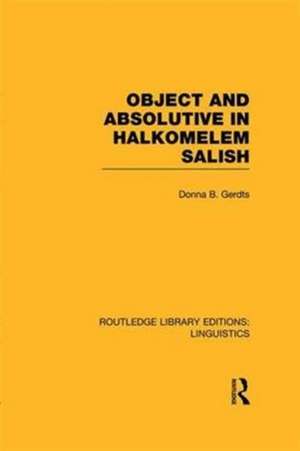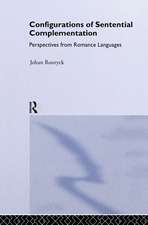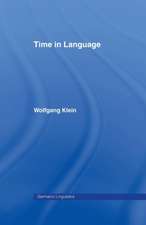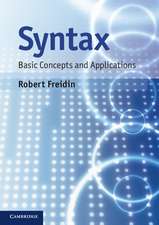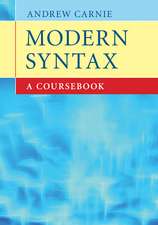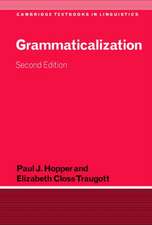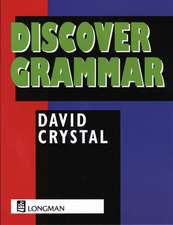Object and Absolutive in Halkomelem Salish (RLE Linguistics F: World Linguistics): Routledge Library Editions: Linguistics
Autor Donna B. Gerdtsen Limba Engleză Paperback – 20 mai 2016
| Toate formatele și edițiile | Preț | Express |
|---|---|---|
| Paperback (1) | 299.52 lei 6-8 săpt. | |
| Taylor & Francis – 20 mai 2016 | 299.52 lei 6-8 săpt. | |
| Hardback (1) | 1005.04 lei 6-8 săpt. | |
| Taylor & Francis – 21 noi 2013 | 1005.04 lei 6-8 săpt. |
Din seria Routledge Library Editions: Linguistics
-
 Preț: 355.69 lei
Preț: 355.69 lei - 18%
 Preț: 1000.27 lei
Preț: 1000.27 lei - 18%
 Preț: 1003.93 lei
Preț: 1003.93 lei - 15%
 Preț: 672.58 lei
Preț: 672.58 lei - 18%
 Preț: 1004.72 lei
Preț: 1004.72 lei - 18%
 Preț: 1004.24 lei
Preț: 1004.24 lei - 18%
 Preț: 999.46 lei
Preț: 999.46 lei - 18%
 Preț: 779.13 lei
Preț: 779.13 lei - 34%
 Preț: 4327.12 lei
Preț: 4327.12 lei - 18%
 Preț: 1004.72 lei
Preț: 1004.72 lei - 15%
 Preț: 637.65 lei
Preț: 637.65 lei - 18%
 Preț: 1001.24 lei
Preț: 1001.24 lei - 34%
 Preț: 4048.76 lei
Preț: 4048.76 lei - 18%
 Preț: 1061.06 lei
Preț: 1061.06 lei - 18%
 Preț: 1063.89 lei
Preț: 1063.89 lei - 18%
 Preț: 783.10 lei
Preț: 783.10 lei - 18%
 Preț: 782.30 lei
Preț: 782.30 lei - 18%
 Preț: 891.85 lei
Preț: 891.85 lei - 18%
 Preț: 1001.84 lei
Preț: 1001.84 lei - 18%
 Preț: 1054.71 lei
Preț: 1054.71 lei - 18%
 Preț: 1003.12 lei
Preț: 1003.12 lei - 18%
 Preț: 1343.56 lei
Preț: 1343.56 lei - 18%
 Preț: 782.62 lei
Preț: 782.62 lei - 34%
 Preț: 5440.48 lei
Preț: 5440.48 lei - 18%
 Preț: 1002.80 lei
Preț: 1002.80 lei - 15%
 Preț: 672.90 lei
Preț: 672.90 lei - 18%
 Preț: 1003.93 lei
Preț: 1003.93 lei - 34%
 Preț: 2378.63 lei
Preț: 2378.63 lei - 18%
 Preț: 1061.84 lei
Preț: 1061.84 lei - 18%
 Preț: 1006.92 lei
Preț: 1006.92 lei - 18%
 Preț: 1001.24 lei
Preț: 1001.24 lei - 34%
 Preț: 1821.92 lei
Preț: 1821.92 lei - 18%
 Preț: 1003.93 lei
Preț: 1003.93 lei - 18%
 Preț: 1285.04 lei
Preț: 1285.04 lei - 18%
 Preț: 1062.62 lei
Preț: 1062.62 lei - 18%
 Preț: 1061.06 lei
Preț: 1061.06 lei - 18%
 Preț: 781.82 lei
Preț: 781.82 lei - 18%
 Preț: 1058.69 lei
Preț: 1058.69 lei - 18%
 Preț: 1001.07 lei
Preț: 1001.07 lei -
 Preț: 330.87 lei
Preț: 330.87 lei - 18%
 Preț: 1169.78 lei
Preț: 1169.78 lei - 18%
 Preț: 1060.25 lei
Preț: 1060.25 lei - 18%
 Preț: 1002.02 lei
Preț: 1002.02 lei - 18%
 Preț: 1001.24 lei
Preț: 1001.24 lei - 18%
 Preț: 1287.89 lei
Preț: 1287.89 lei - 15%
 Preț: 673.09 lei
Preț: 673.09 lei - 18%
 Preț: 1956.17 lei
Preț: 1956.17 lei - 34%
 Preț: 1293.09 lei
Preț: 1293.09 lei
Preț: 299.52 lei
Preț vechi: 349.10 lei
-14% Nou
Puncte Express: 449
Preț estimativ în valută:
57.31€ • 59.84$ • 47.33£
57.31€ • 59.84$ • 47.33£
Carte tipărită la comandă
Livrare economică 15-29 aprilie
Preluare comenzi: 021 569.72.76
Specificații
ISBN-13: 9781138994560
ISBN-10: 1138994561
Pagini: 296
Dimensiuni: 156 x 234 mm
Greutate: 0.45 kg
Ediția:1
Editura: Taylor & Francis
Colecția Routledge
Seria Routledge Library Editions: Linguistics
Locul publicării:Oxford, United Kingdom
ISBN-10: 1138994561
Pagini: 296
Dimensiuni: 156 x 234 mm
Greutate: 0.45 kg
Ediția:1
Editura: Taylor & Francis
Colecția Routledge
Seria Routledge Library Editions: Linguistics
Locul publicării:Oxford, United Kingdom
Cuprins
1. Introduction to Halkomelem 2. Some Basic Phenomena of Halkomelem 3. Advancements to Object 4. Object Resignations 5. Passives 6. Conclusion
Descriere
This book treats aspects of the syntax of Halkomelem, a Salish language spoken in southwestern British Columbia, specifically those constructions which involve objects, and seeks to accomplish two goals. First, it provides natural language fodder for the debate concerning the nature of grammatical relations and their place in syntactic theory. Second, by showing that Halkomelem draws from a familiar class of universal constructions and organizes its syntax around some simple and common parameters, the author has brought the Salish languages, which due to their phonological and morphological complexity seemed particularly fearsome, into cross-linguistic perspective.
